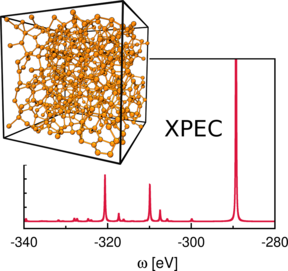Unravelling the microscopic structure of materials

XPEC will integrate together machine-learning data classification and high-dimensional regression with multilevel quantum chemistry methods (DFT and GW) to create the ultimate predictive tool for computational generation of X-ray spectra.
X-ray spectroscopy is a powerful tool to unravel the microscopic structure of materials, that is, how atoms are arranged at the nanoscale. This experimental technique would in principle allow us to precisely establish the nature of chemical bonding in functional materials and make the link between a material's atomic structure and its performance in real-life applications. This knowledge is of vital importance to optimize the new generation of materials needed for environmentally-friendly technologies, such as clean fuel production and sequestration of atmospheric CO2. Unfortunately, interpretation of X-ray spectra of complex materials is extremely challenging, since signals coming from different atomic environments overlap. The new computational approach developed within the XPEC project will provide an invaluable tool to predict X-ray spectra and interpret existing experimental results.
Picture: Dorothea Golze
Read more news

Apply Now: Unite! Visiting Professorships at TU Graz
TU Graz, Austria, invites experienced postdoctoral researchers to apply for two fully funded visiting professorships. The deadline for expressions of interest is 20 February 2026, and the positions will begin on 1 October 2026.Soil Laboratory Exhibition – Exploring the Dialogue Between Human and the Earth in Utsjoki
Soil Laboratory explores the relationship between humans and the earth as a living landscape through ceramic practices in Utsjoki.
The Finnish Cultural Foundation awarded grants for science and art
A total of 15 individuals or groups from Aalto University received grants






